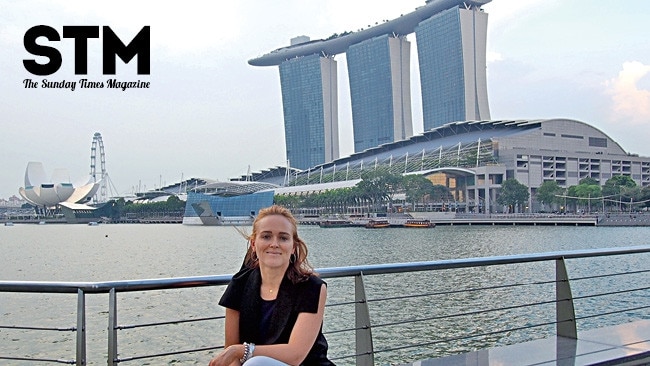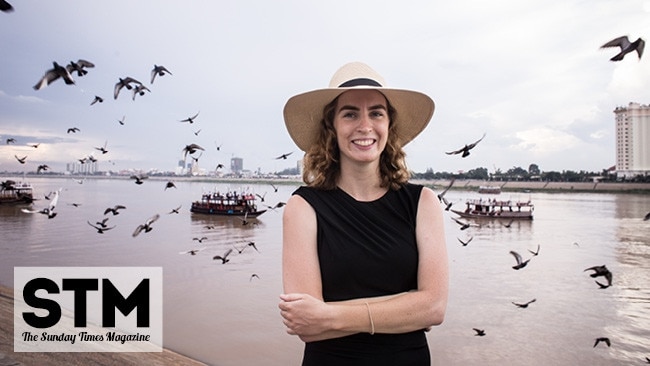Make benefit for Kazakh culture
THE former Soviet satellite defies the Borat movie cliches, as a queasy Fiona Hudson discovered after a few sips of camel milk at a Kazakh banquet.

SORRY, the waiter informs our interpreter, there's no fermented mares' milk today. I do my best to look crestfallen.
"It's okay," the translator assures me. "He'll bring camel milk – the number-two drink of Kazakhstan."
A few sips of this vile brew make the horse sausage, boiled mutton and the rest of the dishes in the banquet that follows almost tasty.
We eat perched on the side of a snow-covered mountain, inside a yurt – one of the tent-like dwellings the original nomadic Kazakh tribes used.
This traditional lunch is a tourist gimmick, and as close as we come to the backward country portrayed in the box-office hit Borat: Cultural Learnings Of America For Make Benefit Glorious Nation Of Kazakhstan.
At the foot of the mountain is Almaty, one of the former Soviet republic's most cosmopolitan cities. It's awash with money as foreign capitalists swoop in on oil and mineral reserves lying under the nation's vast expanses. (Kazakhstan is the ninth-largest country in the world.) There are still some throw-backs to former Communist rule, though – not least the bureaucracy and queues to obtain a visa, and some of the strictest border-control officers you'll ever encounter.
Outside the airport, the air is thick with smoke spewed out by coal-fired power stations and thousands of cars on traffic-clogged streets. Falling snow quickly turns to grey sludge.
The route from the airport is lined with car dealerships selling luxury vehicles to Almaty's rapidly expanding population of multi-millionaires.
Sipping a local brew in the foyer of our upmarket hotel as I wait for my companions, I overhear an American businessman sealing an $8 million contract as if he were buying a loaf of bread.
(The money floating around explains the large number of prostitutes hoping to make "sexy time" with foreigners.) Our first tourist stop is the Green Bazaar, where locals shop for vegetable and horse flesh.
Roughly translated, Almaty means "city of apples", and there are a dozens of varieties piled into colourful pyramids.
There's also some of the cheapest caviar in the world, and an array of traditional felt hats. (Be careful when selecting, though. One of our party unwittingly bought a style typically worn in Uzbekistan, Kazakhstan's traditional rival, and got more than a few nasty looks.) The market doesn't sell Gucci, Prada or other luxury branded goods, but rest assured there are plenty of ritzy stores dotted around town catering for the rich-listers.
Almaty is a construction zone, with cranes dotted around the skyline erecting apartment towers, office blocks and shopping complexes.
Street signs are in Kazakh and navigating around town isn't easy, but we somehow find our way to the grand Zenkov Cathedral. Built from wood, this impressive candy-coloured structure was one of the few buildings to survive a huge earthquake in 1911.
Though Kazakhs are the dominant ethnic group, there is a strong Russian influence in the city. Next to the cathedral is an impressive war memorial where young university students from the 65 or so tertiary institutions in Almaty congregate.
They're keen to chat, and tell us a visit to the nearby state theatre is a must.
Unfortunately, it's closed because of a pay dispute with the ballerinas, so we brave a bus ride to the snow-capped peaks of the Chimbulak Ski Resort, regarded as one of central Asia's best.
The air up here is crisp and a relief from the pollution below.
After that stomach-churning lunch in a domed yurt, we head for the Mondeo Skating Rink to watch the Kazakhstani speed skaters training. This outdoor ice rink has been chosen to host the 2011 Asian Winter Games, Over dinner at the hip Di Wang Chinese restaurant, we lament that we don't have a day or two more to venture outside Almaty.
A three-hour flight away is the region Russia used as its main nuclear weapons testing site – an area even more toxic than Chernobyl. Former Stalin gulags are also dotted around the surrounding countryside.
Locals say that no matter how far out you go, Kazakhstan bears no resemblance to the Borat movie, which they point out was shot largely in Romania.
The real appeal of Kazakhstan is not its tourist sites, but – to borrow Borat's phrase – the cultural learnings of a country in obvious transition.
One key learning to keep in mind: hold on to your passport, as thefts are fairly common.
One Australian student was stung recently when the capitalist police who found his lost travel document demanded $US200 ($A255) to return it. He bargained them down to $80.
At the airport duty-free shop, I remember another important lesson and steer clear of the cheap local vodka, which takes your breath away faster than Almaty's polluted air.
When I ask the salesman for a more expensive brand, he apologises and says they've run out.
I don't wait for him to offer a camel substitute.
Getting there: Emirates to Dubai, with connections on Air Astana to Almaty.
The Sunday Telegraph



